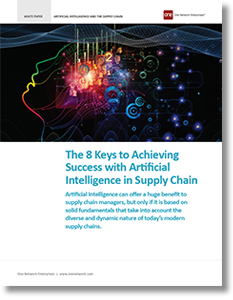Brexit Impact on Distribution, Warehousing & Supply Chains

We’re all sick of hearing about it, but for business leaders, warehousing and distribution operational managers, Brexit is posing tough questions and threatens to derail many supply chains.
Brexit and Supply Chains
As the biggest decision in many of our lifetimes, the UK’s departure from the European Union (Brexit) will have consequences – good and bad – that will ripple through decades to come.
In recent weeks, one prominent concern has been the impact a Brexit “no deal” scenario could have on imports, particularly for the food and manufacturing industries.
Search Supply Chain 24/7 “Brexit”
With the government’s preliminary deal yet to be approved by Parliament, and the date of departure just a few months away, businesses are finding that it’s necessary to stockpile goods and resources, just in case things don’t go to plan.
For this, they need a huge amount of storage space – and both businesses and storage providers are frantically scrabbling to deliver.
Deal or No Deal Brexit?
Concerns linger over the potential for a “no deal” Brexit, particularly as dissatisfaction persists over the nature of the deal that’s been negotiated.
The prospect of there being no customs arrangements when the UK leaves the Union in March is a worrying one, as it means UK ports would have to default to World Trade Organisation (WTO) rules and tariffs.
Related: Mobilizing Your Business for Tough Times and Global Commerce
Not only are these far more expensive for businesses looking to import (on top of the falling value of the pound), but they’re also more complicated than present rules, and require far more paperwork.
With former Brexit secretary Dominic Raab admitting in October that he hadn’t realized how disruptive Brexit would be to the Dover-Calais link, it seems that training and preparation at UK ports are somewhat lacking. The UK last applied these tariffs before joining the EU in the 1980s, and few members of the Border Force are left who have an idea of how they are implemented.
This sudden influx of new processes and administrative work would inevitably lead to substantial delays and increased costs, which would create product shortages and immense uncertainty for businesses.
In addition, ports such as the Port of Dover would require significant expansion to deal with the queues of trucks, and likely additional staff, none of which is particularly compatible with funding cutbacks over the past decade.
Even in the event of a more business-friendly ”customs union” Brexit, there are likely to be teething problems which cause disruptions and delays.
Pragmatic Planning
Businesses across all industries have been dealing with the after-effects of Brexit since the Brexit vote, with contingencies being drawn up and assets moved around for months. With food and medicine stocks requiring a more short-term approach, however, much of this stockpiling has only taken place in the last few months, in preparation for the withdrawal date of 29th March 2019.
In the food industry, businesses storing additional goods include Majestic Wines, Premier Foods (owners of Mr. Kipling), Nestle, and catering company Compass. Cold Storage specialists Wild Water are having to turn new customers away after storing 40,000 pallets of goods in preparation. Ministers have reportedly told companies to start stockpiling baby formula, as 80% of the UK supply comes from the continent.
Consumer Goods Technology Webcast: Building the Consumer Value Chain
In the pharmaceutical sector, companies including AstraZeneca are stockpiling medicines, while Clinical Commissioning Groups (CCGs) have warned that individuals may soon start stockpiling medicines in anticipation of shortages. Airbus and Rolls Royce have both stockpiled components they need for manufacturing.
And what about that incidental that we take for granted, packaging? 90% of packing material is imported, with the vast majority of that, 80%, from the EU. This puts the packing of a whole range of goods within the UK at risk.
Insufficient Storage
The sudden influx of goods has created a dilemma: there simply isn’t enough storage capacity to hold all of these goods. The issue isn’t necessarily a temporary one either, as a “no deal” Brexit may require businesses to increase their orders so they can accommodate for ongoing customs delays.
Some have claimed that the lack of food storage is down to Amazon; industry observers claim they have bought up units for an imminent expansion of their grocery shopping service.

Businesses who lack internal storage capacity are finding warehouse providers full, or raising the rates they charge for temporary storage. As a result, many are having to optimize their existing storage spaces to host more racking, or are installing entirely new storage systems.
Modular, high-density racking is best suited to this kind of storage, with the capacity to host pallets as well as smaller or more awkwardly shaped items.
For some businesses, this has proved to be a blessing in disguise. The sudden need to reconsider warehouse usage, operations, and aging storage spaces, has led to renovations that have enhanced their efficiency, as well as increased their storage capacity.
The flexibility of modern pallet racking and mobile shelving also means that the spaces can be repurposed when the issues around Brexit are settled, and the shelving can even be dismantled and placed elsewhere.
Beyond Brexit
While things look uncertain now, the example of Amazon apparently expanding their storage capacity in the UK shows that there is life beyond Brexit. Whatever happens in March, the UK remains one of the world’s largest and most forward-thinking consumer markets and one where eCommerce continues to dominate people’s shopping habits.
As a result, the importance of storage space for goods is only likely to increase.
With population density in the UK already high, and warehouse space at a relative premium, this creates a particular dilemma for eCommerce companies. This is not only an issue for UK companies storing and delivering products within the UK, but also for US companies and other foreign sellers.
While selling from within the UK will bypass distance selling thresholds, renting local storage space may be seen as necessary to avoid the impact of delays on international deliveries.
For these businesses, there may be more to consider than simply increasing storage capacity by building racking higher or deeper. New processes may be required to increase the efficiency of storage and retrieval, such as the implementation of automated storage and retrieval (AS/RS) systems tied into warehouse management systems.
Increasingly powerful AI technology and autonomous vehicles are beginning to revolutionize warehouses and could be pivotal in ensuring that the flow of goods in and out of the UK remains steady in post-Brexit Britain.
While many businesses would have preferred more certainty around the consequences of Brexit, the challenges it has posed are also opening doors. The need to cater to an increase in inventory ahead of the withdrawal date is unfortunate, but it is leading people to reconsider their storage strategies and to start planning for the future.
This head start could make British businesses more competitive in the long run and set the UK up for a rosier future.
Read: The Difference between a Traditional Warehouse and an OmniChannel Warehouse
About the Author
James Beale is Operations Manager at Invicta Pallet Racking. For over 25 years Invicta has been at the forefront of the archive storage industry throughout the UK and Europe, designing and installing some of the largest pallet racking and storage systems currently found on the market.
Recommended Reading on Global Trade
- How to Optimize Port Throughput in Global Supply Chains – how to maximize resources and plan more effectively with real-time visibility to inbound supplies and outbound transportation.
- Customs Warehouse: Smoothing the Global Supply Chain – how a customs warehouse can help absorb the peaks and troughs that impact the supply chain.
- Multi-Enterprise Business Networks are revolutionizing how businesses connect and transact.
Related Article Control Towers for CFOs: Aligning Finance and the Supply Chain in the Extended Enterprise
Related White Papers
8 Keys to Achieving Success with Artificial Intelligence in Supply Chain
This white paper looks at the fundamentals that supply chains need in place in order to achieve real results from Artificial Intelligence implementations. Download Now!
Can Blockchain Revolutionize the Supply Chain?
In this white paper Ranjit Notani, One Network CTO examines Blockchain’s powerful potential as well as a major problem and whether and how Blockchains can revolutionize the Supply Chain. Download Now!
The Internet of Things and Your Supply Chain
This white paper offers a quick and clear guide to the Internet of Things (IoT), it explains why this technology is so exciting for supply chain and offers a few examples of how it and related technology can be used to dramatically cut costs. Download Now!
Supply Chain’s New World Order
This white paper details how companies can leverage the cloud for predictive and actionable supply network operations, integrated financial measurement, and integrated business planning. Download Now!
More Resources on Supply Chains
Article Topics
One Network Enterprises News & Resources
Blue Yonder announces an agreement to acquire One Network Enterprises for $839 million Blue Yonder Acquires One Network Enterprises for $839M Companies Need to Develop New Innovative Approaches to Supply Chain Design How to Improve Cost of Goods Sold Horizontally Across the Supply Chain How the Global Pandemic Accelerated Supply Chain Visibility, Digitalization, and Automation AI and Data, the Future of Supply Chain Management AI and Supply Chain Problem Solving More One Network EnterprisesLatest in Warehouse|DC
Microsoft Unveils New AI Innovations For Warehouses Spotlight Startup: Cart.com is Reimagining Logistics Walmart and Swisslog Expand Partnership with New Texas Facility Taking Stock of Today’s Robotics Market and What the Future Holds U.S. Manufacturing Gains Momentum After Another Strong Month Biden Gives Samsung $6.4 Billion For Texas Semiconductor Plants Walmart Unleashes Autonomous Lift Trucks at Four High-Tech DCs More Warehouse|DC


















